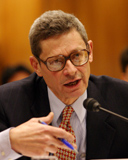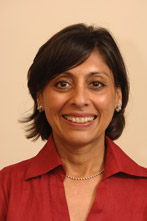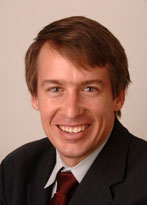AS/COA Online | Interview: Leopoldo López on Venezuela's Political Alternative
/Leopoldo López Mendoza, mayor of the Chacao municipality of Caracas, was a frontrunner in the race for the mayoralty of the Venezuelan capital until he, along with hundreds of other opposition candidates, was banned from running in November municipal elections. In an exclusive interview with AS/COA Online’s Carin Zissis, López talks about the questionable legality of the ban and the threat it poses to democracy in Venezuela. López, who won 81 percent of votes when he ran for reelection for his current post in 2004, says inequality and public security serve as Venezuela’s main challenges.
AS/COA: Venezuela’s electoral council barred hundreds of mostly opposition candidates from running in the November municipal election on the basis of unproven corruption charges. You’ve been prohibited from running for the mayoral post of Caracas. Given the current block against your candidacy, what are your short-term political goals?
López: The first goal is to help promote the candidates that can run and to promote possible victories in municipalities and governorships in this upcoming elections.
AS/COA Online | Interview: U.S. Ambassador to Brazil Clifford Sobel on Bilateral Partnerships
/[W]e have a lot of very fertile areas where we look for partnership and for growth in our economic, investment, and cultural institutions."
AS/COA: In what ways do you see current economic and political factors converging to support opportunities for U.S.-Brazilian partnerships?
AS/COA Online | Interview: Jair Ribeiro on Model for Adopting, Improving Brazilian Schools
/CPM Braxis CEO Jair Ribeiro, in an interview with AS/COA Online Managing Editor Carin Zissis, discusses Partners in Education (Parceiros Da Educação), a program he established in São Paulo to match executives with schools—particularly in poor and underserved areas—to improve teacher training and boost students’ test scores. The program has proven to show marked results in the “adopted” schools. As the model developed by Partners in Education evolves and improves, executives from across Brazil approached the organization about adopting the model in other parts of the country.
AS/COA: Can you tell me a little bit about the history of Partners in Education and how and why you started it?
AS/COA Online - Interview: FIU's Eduardo Gamarra on Bolivian President Evo Morales' "Riskless" Recall Vote
/AS/COA Online - Interview: Helio Mattar, President of the Akatu Institute for Conscious Consumption on Corporate Social Responsibility in Brazil
/ “When we talk about CSR we are talking about the collective interest of society; we are talking about returns to stakeholders, not only returns to shareholders.”
“When we talk about CSR we are talking about the collective interest of society; we are talking about returns to stakeholders, not only returns to shareholders.”
Brazil’s Helio Mattar, who serves as the president of the Akatu Institute for Conscious Consumption and founded the Ethos Institute for Social Responsibility talks with AS/COA Online Managing Editor Carin Zissis about the strength of the corporate social responsibility movement (CSR) in Brazil and across the Americas. Mattar, a leading expert in the field of CSR, discusses the factors behind Brazil’s prominent CSR movement and the need for companies to remain accountable to consumers. A former CEO and government minister, Mattar outlines essential evolution for companies must undertake to maximize the capacity of CSR efforts. “[W]e’ve changed the level of consciousness in the market, and companies will have to change the level of action that they will have in social and environmental areas,” says Mattar, who served as a moderator of an AS/COA roundtable on CSR during AS/COA’s annual Latin American Cities Conference in São Paulo, Brazil in July 2008.
AS/COA: Across Latin America, according to Akatú’s research, 50 to 80 percent of consumers have an interest in what companies are doing in terms of corporate social responsibility. The rate is particularly high in Brazil.
Mattar: It is. It has been between 75 and 78 percent in the last seven years.
AS/COA: What are the factors behind this high rate of interest in CSR in Brazil?
Mattar: I think there is one attribute, which it is not Brazilian. I am totally convinced that mass communication, Internet all over the place, and telecommunications all over the place means that people are becoming more and more sensitive to social and environmental issues.
AS/COA Online - Interview: Rubén Beltrán, Consul General of Mexico, on Serving U.S.-Based Latino Populations
/
In an exclusive interview, Consul General of Mexico in New York Rubén Beltrán speaks with AS/COA Online Managing Editor Carin Zissis about a new initiative bringing together Latin American consulates to expand services for immigrants in the tri-state area. The coalition marks the beginning of the project through the June 21 Feria Consular Latinoamericana in Harrison, New Jersey, where the consulates Mexico, Colombia, Costa Rica, Ecuador, El Salvador, Guatemala, Peru, the Dominican Republic, and Uruguay will provide services. Beltrán also discussed the challenges facing Mexican immigrant communities across the country and consular efforts to meet the needs of New York’s rapidly growing Mexican community.
AS/COA: You described this initiative (the Feria Consular Latinoamericana) as the first of its kind with this many consul generals coming together. Can you talk about how these consul generals came together and why now?
Beltrán: Well, it is the first time that several consulates of Latin America in the U.S come together to provide services in a joint fashion simultaneously...
AS/COA Online - Interview: Student Activist Yon Goicoechea on Venezuela's Political Future
/
“I believe that to have modern countries, we also have to renew our political structures.”
Yon Goicoechea, Venezuelan law student, activist, and founder of the Futuro Presente Foundation spoke with AS/COA Online Managing Editor Carin Zissis about his country's student activist movement, widely credited with playing a pivotal role in the defeat of a December 2007 constitutional referendum. Goicoechea was recently awarded the 2008 Milton Friedman Prize for Advancing Liberty from the Cato Institute.“There are hundreds of thousands of young Venezuelans with a firm commitment to making good policy practices and that’s why I believe that in 10 years we will have renewed institutions in Venezuela and new opportunities for improvement,” says Goicoechea.
AS/COA: How did Venezuela’s student movement begin?
AS/COA Online - Entrevista: Activista Estudiantil Yon Goicoechea sobre el Futuro Político Venezolano
/“Yo creo que para tener países modernos también hace falta renovar nuestras estructuras políticas.”
Yon Goicoechea, estudiante venezolano de derecho, activista y fundador de la fundación Futuro Presente habló con la editora de AS/COA Online Carin Zissis sobre el movimiento estudiantil, ampliamente acreditado como pieza importante en la derrota del referendo constucional de diciembre del 2007. Goicoechea fue recientemente galardonado con el premio Milton Friedman Prize for Advancing Liberty del Cato Institute. “Hay cientos de miles de jóvenes en Venezuela comprometidos en hacer política de la buena y por eso creo que en 10 años vamos a tener nuevas instituciones en el país y nuevas oportunidades para hacer las cosas mejor,” dice Goicoechea.
AS/COA: ¿Como empezó el movimiento estudiantil en Venezuela?
AS/COA Online - Secretary General José Miguel Insulza on the OAS Role in the Western Hemisphere
/“The sub-regional integration institutions will gather more strength. But we still need a forum for hemispheric dialogue.”
José Miguel Insulza, secretary general of the Organization of Americas States, spoke with AS/COA Online Managing Editor Carin Zissis following an Americas Society/Council of the Americas event about the OAS role in promoting democracy in Latin America (Listen to audio of Insulza’s remarks). In recent months, the OAS has played a central role in negotiations related to regional matters, including a vote on autonomy in Bolivia’s Santa Cruz province and the March Andean standoff between Colombia and its neighbors Ecuador and Venezuela after a Colombian attack on a FARC camp inside Ecuador’s borders. “What I think is that the OAS has to prove itself as the main forum for political dialogue in the Americas, prove itself to be a bona fide intermediary in the problems among or within countries, and especially act very independently based only on Inter-American law,” said Insulza of the organization, now in its sixtieth year.
AS/COA: During your remarks you discussed the recent Andean crisis. There’s been discussion about the role of the OAS in that matter. You talked about how quickly the OAS had to respond to that issue. Can you talk about how that has affected the OAS and the process by which various issues are handled?
Insulza: We have tried very hard this year, not only to be relevant but to be timely at the same time. I fear all the time that something will happen as it did with the Venezuela crisis; in 2002, after the president was deposed, the council met and they were still meeting when the president was re-instated.
I think [the handling of the recent crisis] has given us a lot of legitimacy to work on the process. Basically, we were very evenhanded. We understood the Colombian motives, we understood the Ecuadorian rights, and we managed to forge a consensus on that.
AS/COA Online - JPMorgan's Joyce Chang on Latin American Markets
/
Managing Director and Global Head of JPMorgan Chase’s Emerging Markets Research Group Joyce Chang talked with AS/COA Online Managing Editor Carin Zissis about Latin American markets and how they will face a U.S. economic downturn. JPMorgan predicts 5 percent or more growth for emerging market countries in 2008, says Chang, who notes that “the commodities rally continues to support terms of trade in Latin America." Chang says, “China is critical for emerging market economies given that it has been the key source of marginal demand for commodities in recent years.”
AS/COA: Debate has raged in recent months over how the U.S. recession will affect the global economy. How are Latin American emerging markets faring given the U.S. economic downturn?
AS/COA Online - Pew Hispanic Center's Susan Minushkin on the Latino Vote
/
Deputy Director Susan Minushkin of the Pew Hispanic Center spoke with AS/COA Online Managing Editor Carin Zissis about the buzz over the Latino electorate’s role in this year’s presidential election. Minushkin emphasized that the number of Latino voters has and will continue to grow as immigrants become naturalized and the large pool of young Hispanics reaches voting age. The immigration debate may have played a role in the abatement of Latino voters identifying with the Republican Party, she says.
Minushkin, who worked previously as a professor at the Centro de Investigaciones y Docencia Economicas (CIDE) in Mexico City, also talked about President Felipe Calderon’s upcoming visit to the United States—his first official visit since taking office—and the high level of Mexican interest in U.S. elections: “Mexicans see that whatever happens in the U.S. elections as having a direct affect on the future of their country.”
AS/COA: The issue of the Latino vote has been a big one this election year. What’s different this time around compared to previous years in terms of the Hispanic electorate?
AS/COA Online - Interview: Jorge Castañeda, Former Foreign Minister of Mexico, on Immigration Reform
/"It takes leadership because most politicians in the United States don’t want to lead on this. They look at McCain and they say, 'Look what happened to him.' Who wants to take a leadership position on this and then get slammed in Iowa?"
In an interview, former Foreign Minister of Mexico Jorge Castañeda talks about his new book Ex Mex: From Migrants to Immigrants with AS/COA Online Managing Editor Carin Zissis. Talking before an AS/COA event, Castañeda, who played a firsthand role in attempts to pass a U.S.-Mexican immigration agreement during the Fox administration, says passage of immigration reform will depend on election of a U.S. leader “with more political capital than Bush has.”
The author and political analyst, now a professor of politics and Latin American studies at New York University, also says the need for a decision on comprehensive immigration reform will become increasingly apparent: “It’s either regression—with all the dangers and the outrages of separating women from their children, of deporting people, of raiding houses—or it’s reform.”
AS/COA: In the book, you discuss how immigration reform became central to Mexican foreign policy after [former President Vicente] Fox came to power. Meanwhile, in the United States there has been this turn towards nativism. Given the implied conflict here, what will it take for immigration reform to move forward?
CFR.org | Park: Private Sector Solution Could Resolve North Korean ‘Radioactive Funds’ Issue
/
John S. Park, head of the Korea working group at the United States Institute of Peace, discusses the controversy over $25 million in North Korean funds holding up a February 2007 denuclearization deal. Although the U.S. State Department pledged to release the money from Banco Delta Asia (BDA) in Macao, banks around the world consider the funds tainted by a U.S. Treasury Department ruling that connects the $25 million with illicit activities.
“The $25 million is the financial equivalent of radioactive funds,” explains Park, who says the time has come “to start thinking out of the box of having governments approach third party banks.” He suggests a private sector solution to the current stalemate and that Asia’s experience with troubled banks during the 1997 financial crisis provides a model for resolving the issue. Monetary authorities in Macao could declare BDA a distressed bank and put it up for sale, explains Park. He says the BDA banking license in a recapitalized format could result in a “lucrative sale” in which the proceeds “can be used for the clean transfer of $25 million to a bank designated by North Korea.”
CFR.org | Abbas: Musharraf’s Sinking Credibility
/
Hassan Abbas, a research fellow at Harvard University and author of Pakistan’s Drift into Extremism, served as an official in the administrations of Pakistani President Pervez Musharraf and former Prime Minister Benazir Bhutto. He discusses escalating violence over Musharraf’s decision to suspend Pakistan’s Supreme Court chief justice and says it signifies “the beginning of the end” for the president, who seized power in a 1999 coup. Abbas says deadly clashes over the judicial crisis could not have occurred “without instruction from the top,” and that the government wished to show it would not tolerate dissent. The possibility of an agreement between Musharraf and the exiled Bhutto appears increasingly remote given the Supreme Court controversy, says Abbas.
CFR.org | Southerland: Chinese Bloggers Bypass Censors to Break Stories
/
Dan Southerland, executive editor at Radio Free Asia, discusses whether Chinese bloggers can push for more open media in China by getting around censors to break news. He cites a recent story, which made international headlines and was initially covered by bloggers, about a woman in southern China who resisted government siezure of her property. Southerland concedes that most of China's roughly 60 million bloggers write about personal matters and, when covering news, often fail to include essential details about where or when an event took place. However, he says, “If everybody suddenly decided that they would stop censoring themselves I think they could easily overwhelm the government” and could “get a little beyond the superficiality” of state-run media. Southerland also discusses “online muckrakers” who uncover stories about local government corruption and push news past monitors by praising the central government.
CFR.org | Hills: U.S.-Chinese Relations Need “Habits of Cooperation”
/A new CFR Task Force Report on U.S.-Chinese relations recommends an “affirmative agenda of integrating China into the global community” with a view toward involving Beijing in discussions on security, trade, human rights, and China’s growing military power. Carla A. Hills, CFR’s vice chairman and co-chair of the China Task Force, says the report’s recommendations seek to address “political resistance at home that emanates from worries about China’s rapid growth in the last two decades.” Hills, who served as the U.S. trade representative during the administration of George H.W. Bush, says creating “habits of cooperation” will serve as a means for China to adopt “international norms.”
CFR.org | Kripalani: Pakistani Protests May Leave Musharraf's Political Future "Extremely Uncertain"
/
Manjeet Kripalani, CFR press fellow and India bureau chief for BusinessWeek, discusses the increasing social unrest in Pakistan caused by President Pervez Musharraf's decision to suspend Chief Justice Iftikar Chaudhry. She says the crisis could leave the president's political future "extremely uncertain.
CFR.org | Minzner: "Institutional Failure" Leads to Social Unrest in China
/
CFR International Affairs Fellow Carl Minzner, an expert on Chinese domestic issues and former senior counsel at the Congressional-Executive Commission on China, discusses the increase in social unrest in China. He says that in China, a country under one party rule lacking institutional means to address grievances at the local level, "central leaders don't necessarily know what's going on until ten thousand local farmers make it out of a particular area and mount a collective protest."
CFR.org | Esarey: China's New Media Laws An “Experiment”
/Ashley W. Esarey, a China media expert and author of a Freedom House report on Chinese press censorship, discusses the new regulations giving foreign journalists press freedoms through the end of the Beijing 2008 Olympic Games. He calls the new laws an “experiment” by the Communist Party and says the press freedoms may become permanent unless they “lead Chinese journalists to call for more freedom themselves.”
